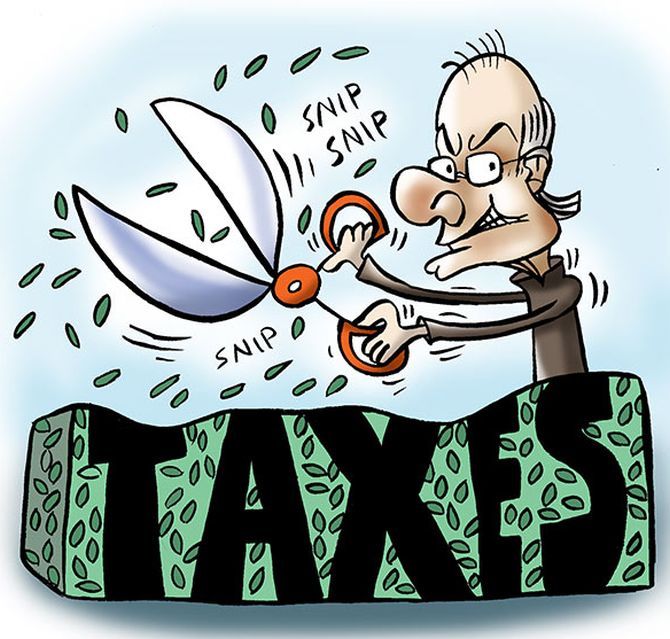A panel will draft direct tax legislation, keeping in mind the system in other countries, international best practices and economic needs of the country.
Illustration: Uttam Ghosh/Rediff.com

The government has brought back the main author of the now junked Direct Taxes Code (DTC) as a convenor of the task force to review the decades-old provisions of the Income-Tax Act and draft a replacement.
The government has, however, already implemented many provisions of the draft DTC, such as the General Anti-Avoidance Rules (GAAR) and on Place of Effective Management.
The government has constituted a six-member panel to take forward Prime Minister Narendra Modi’s call for replacing the I-T Act, a week after it notified an overhaul of the Goods and Services Tax (GST).
The panel has been asked to submit report within six months.
Arbind Modi, member (legislation) of the Central Board of Direct Taxes (CBDT), is convenor of the task force.
Chief Economic Advisor Arvind Subramanian will be a permanent special invitee.
Rajiv Memani, chairman and regional managing partner, India region, EY, who was named member of the task force, said,"The government continues to undertake bold yet much- needed reforms.
"This steadfast focus will enhance India's competitiveness and make the country future ready."
The panel will draft direct tax legislation, keeping in mind the system in other countries, international best practices and economic needs of the country, say the terms of reference.
Neeru Ahuja of consultancy Deloitte India recalled the earlier occasion the government tried to rewrite the Act, in 2010, the DTC was the outcome.
"Ironically, significant changes which were proposed in the DTC have since been incorporated in the Act over the years.
"A lot of movement has happened in the tax world since then, the most important being (on) BEPS (base erosion and profit shifting)," she said.
Frank D'Souza of consultants PwC said with the experience of DTC, it would be interesting to see how this attempt would unfold.
"Clearly, the need to have the law more relevant to the current economic and business environment is very much there." Sanjay Sanghvi of Khaitan & Co felt present law already contained most of the international best practices - GAAR, transfer pricing, BEPS and so on.
"It would be helpful if the new tax law emphasises more reasonable and fair administration of the laws, to address the concerns on uncertainties and needless litigation," he said.
The DTC Bill, tabled in Parliament in 2010, lapsed with the dissolution of the 15th Lok Sabha.
The Bill had proposed annual income tax exemption limit at Rs 200,000, imposing 10 per cent tax on income between Rs 200,000 and Rs 500,000, 20 per cent on Rs 5-10 lakh and 30 per cent above Rs 10 lakh.
Currently, income up to Rs 250,000 per annum is exempt, while there is 5 per cent tax on over Rs 250,000 to Rs 500,000, 20 per cent on over Rs 5 lakh to Rs 10 lakh and 30 per cent on Rs 10 lakh.
As such, the current tax rates are far more benign than DTC Bill provisions.












 © 2025
© 2025